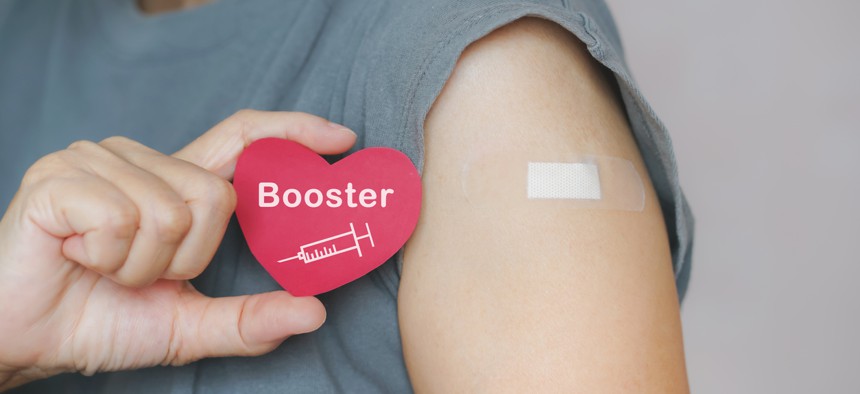Mental Health Disorders Qualify You for a Covid-19 Booster. It’s Unclear How Many People Know That.

istockphoto.com/Ratana21
The Centers for Disease Control and Prevention made the change a month ago, but finding the information online can be tricky.
With an upcoming trip to plan for, psychologist Jacob Dean hopped online to check the eligibility requirements for Covid-19 booster shots in New York City, where he resides.
“At the beginning of the pandemic I qualified because of body mass, but since then I’ve lost 75 pounds,” he said. “I was wondering whether I qualified for a booster, and then I saw that anxiety and depression were listed among the underlying conditions. And I was shocked, because they definitely weren’t there before.”
The change was made last month, when the Centers for Disease Control and Prevention added mental health disorders, including depression and anxiety, to the list of underlying conditions that qualify otherwise healthy adults for Covid-19 booster shots.
A formal announcement came a week later on Oct. 21, via a press release titled “CDC Expands Eligibility for Covid-19 Booster Shots” that makes no specific mention of the addition of mental health conditions and focuses largely on the safety, availability and efficacy of the vaccines in general.
“These recommendations are another example of our fundamental commitment to protect as many people as possible from Covid-19,” Dr. Rochelle P. Walensky, the agency’s director, said in a statement. “The evidence shows that all three Covid-19 vaccines authorized in the United States are safe – as demonstrated by the over 400 million vaccine doses already given. And, they are all highly effective in reducing the risk of severe disease, hospitalization, and death, even in the midst of the widely circulating Delta variant.”
The release doesn’t specify any changes to the existing lists of underlying conditions that qualify adults for booster shots. Those additions can be found only by clicking a link in the news release, scrolling through an alphabetized list of medical conditions, and, for mental health conditions specifically, clicking through a third link to see if anything other than “depression and schizophrenia spectrum disorders” are included.
“It seems that this information is not widely available,” Dean said. “And that’s weird, because it affects millions of people.”
Link Between Covid Mortality and Depression
The addition came amid a growing body of evidence that mental health conditions, notably depression and anxiety, make people of all ages more susceptible to serious illness from Covid-19. A recent review of 21 studies on the link between covid mortality and depression concluded that “individuals with pre-existing mood disorders are at higher risk of Covid-19 hospitalization and death and should be categorized as an at-risk group on the basis of a pre-existing condition.”
“As data from the Covid-19 pandemic has unfolded, we’ve kept a careful eye on those with the highest risks,” Schroeder Stribling, president and CEO of the nonprofit Mental Health America, said in a statement praising the update. “Research has shown that that includes people with certain mental health conditions. The CDC has now validated what we have known for many months, and we must get the word out. The data is clear, the science is clear, and everyone living with a mental health condition should be aware.”
But it’s uncertain how many people are aware. Taken together, the importance of the issue and the lack of fanfare surrounding the change—which could open booster eligibility for millions—seems odd, Dean reiterated.
“Particularly given that one of the consequences of covid is that so many people are experiencing mental health concerns, there is a strange lack of publicity here,” he said. “I would think this would make the pool of eligible people exponentially larger. The question is, how hard is it to get a shot to begin with? How many people are theoretically being excluded from the booster because of the eligibility requirements?”
The answer to that is unclear. More than 31 million people have received a Covid-19 booster shot as of Monday, according to CDC data. Individuals are generally encouraged to self-identify as eligible for booster shots with no requirement of proof of underlying conditions, and most state vaccine websites do not include a comprehensive list of qualifying issues (in New Jersey, for example, residents can peruse a long roster that ends by noting that it “does not include all potential medical conditions”).
Depression has for years been a common condition. In 2019 alone, 18.5% of American adults experienced some level of depression, including more than 19 million Americans, or roughly 8% of the population, who reported at least one major depressive episode. Last year, the pandemic sparked more than 53 million new cases of depression globally, according to recent research.
Still, even those in the health-care industry may not be aware of the change. Dean learned of his qualification only due to his travel plans, and even after confirming his eligibility via the CDC’s guidelines, he encountered different information across platforms.
“I saw this listed on one NYC covid booster portal,” he said. “But it wasn’t listed on the one I used to book my own booster appointment.”
Kate Elizabeth Queram is a senior reporter for Route Fifty and is based in Washington, D.C.

NEXT STORY: Data transparency helps builds public faith in police





